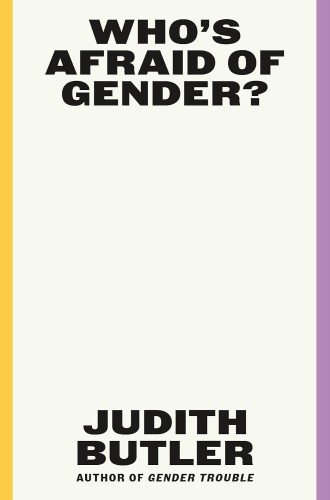The gender phantasm
Judith Butler seeks to understand how and why the word gender has taken on such apocalyptic proportions, including among Christians.

Who’s Afraid of Gender?
On April 8, the Vatican released the declaration Dignitas Infinita. The statement outlines “grave violations of human dignity” in the world today: poverty, war, human trafficking, violence against women. It then lists, as violations on the same level, “gender theory” and “sex change.” The “ideology” of gender, the Vatican warns, is “extremely dangerous,” a “concession to the age-old temptation to make oneself God.” Ye shall be as gods: the serpent’s whisper, coiled around the heart of humanity, font of sin and death.
It’s not just the Vatican that’s haunted by the specter of gender. Hungarian prime minister Viktor Orbán has described the war in Ukraine as a “screen in front of our eyes” distracting us from “the issue of gender and migration.” Italian prime minister Giorgio Meloni has characterized “gender ideology” as “an abyss of death” threatening to swallow up “our civilization.” Donald Trump has warned that “the cult of gender ideology” is “tearing down America.”
Read our latest issue or browse back issues.
Who’s Afraid of Gender?—the newest book by Judith Butler—seeks to understand how and why the word gender came to mean so much more than just gender and how it took on such apocalyptic proportions. “Gender,” Butler says, functions as a “phantasm.” This means it does a kind of psychic and communal work. It gathers together a host of incoherent desires and anxieties, wishes and fears, attractions and revulsions, and organizes them into a single structure that is experienced as coherent and manageable.
This makes “gender” extremely politically useful. As Butler says, there are plenty of reasons to be afraid and anxious today. Economic precarity, nuclear proliferation, social atomization, war, pandemic, climate change. The list goes on. We are right to feel not just afraid but terribly and existentially afraid. Life as we know it is threatened with destruction, and these threats call for global solidarity and bold changes to how we live.
For political movements that resist international solidarity and fight for the interests of capital, it would be convenient if these fears of destruction were scrambled, condensed into something manageable, projected onto a vulnerable minority population. Enter “gender.” Butler writes:
When the word “gender” absorbs an array of fears and becomes a catchall phantasm for the contemporary Right, the various conditions that actually give rise to those fears lose their names. “Gender” both collects and incites those fears, keeping us from thinking more clearly about what there is to fear, and how the currently imperiled sense of the world came about in the first place.
But why gender specifically? Where did the idea of a nefarious gender ideology come from?
As Dignitas Infinita makes clear, the Vatican has been sounding the alarm about “gender” for quite some time. The Catholic Church’s Pontifical Council for the Family coined the phrase “gender ideology” in a 2004 statement, warning of a diabolical rejection of natural law and God’s ordering of creation. That this statement came just after the Boston Globe revealed widespread child sexual abuse in the church is no accident, Butler writes: the church “commits a moral error of gross proportion by projecting and externalizing the specter of its own abusive history onto sexual and gender minorities as a way of making others responsible for its own crimes.”
That phantasm resonated beyond the Vatican, and fears of gender ideology spread rapidly. Today we hear “gender” denounced by Christians, non-Christians, and anti-Christians alike, everyone from right-wing nationalists to “gender critical” feminists. But Butler makes painfully clear that the story of the global anti-“gender” movement is, shamefully, a Christian story.
Perhaps no one comes across worse in Who’s Afraid of Gender? than progressive icon Pope Francis. Celebrated for his denunciations of capitalism, colonialism, environmental destruction, and even homophobia, Francis has taken anti-“gender” paranoia farther than his predecessor. He has likened gender ideology to colonialism (both spread abroad the destructive violence of the elite), nuclear belligerents (both seek to annihilate the created order), and the Hitler Youth (both indoctrinate children into a godless and antihuman ideology). Butler warns that Francis’s reputation as a spiritual guide for the global left launders his anti-“gender” paranoia into spaces where it might otherwise be opposed, like struggles for Indigenous rights or environmental protection. Who’s Afraid of Gender? is a kind of map of the global far right, and Pope Francis’s prominence makes shamefully clear how central Christian voices—even progressive ones like his—are to the movement.
Against Francis, Butler makes the case that the anti-“gender” movement violates human dignity. “The performative act by which gender is publicly claimed communicates the conditions of livability for the one who claims it,” they write. Opposing others’ such acts means “opposing a livable life for a group of people who have made their livable conditions clear.”
It really is that simple. When people say how they need to be addressed in the gendered terms of our language, or when they speak of what Butler calls “the gap between the perceived or lived body and prevailing social norms,” these performative acts make known some conditions that must be met for life to be livable. And the cost of meeting these conditions is remarkably low. At most, a bit of stumbling over a new word or a mild feeling of discomfort over the unfamiliarity of another’s life. That might be all that’s demanded of us to make life livable for another.
When cisgender Christians refuse to accommodate unfamiliarly gendered lives, we are drawing a line in the sand and saying, “I will go this far to make life livable for another person, and no farther.” This line is drawn very close to our own feet. The cost of discipleship, to use Dietrich Bonhoeffer’s phrase, is to have no such line.
Who’s Afraid of Gender? is a painful inventory of the intransigence, contempt, and sheer panic with which so many Christians refuse the most minimal sacrifice for the sake of others. My first instinct is to cast this moral failure onto others: “God, I thank you that I am not like those bigoted Christians.” It would be better for me to tarry with the shame. Those who make trans lives unlivable on Christian grounds, after all, do so on Christian grounds. Rather than pass the blame, I might begin the work of repentance.
Butler ends their book with a call for difficult solidarity. For cisgender Christians like myself, this might mean accepting that we are the “difficult” part of difficult solidarity. Perhaps repentance looks like ceding space and power to trans people—those who, with inexplicable grace and patience, are yet Christian, as well as those who, with understandable hurt and fury, are not.







